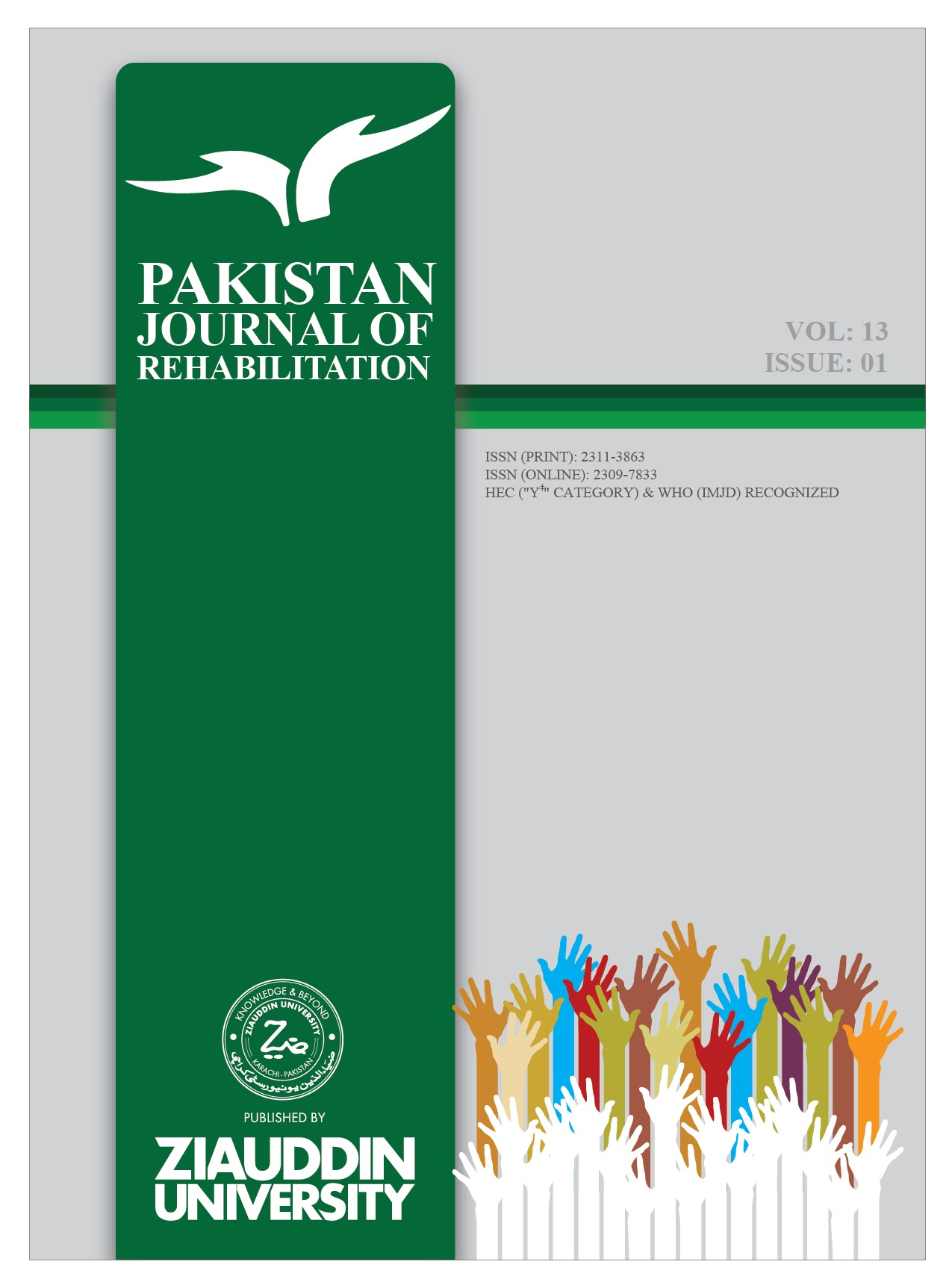12
2
2023
1707976069400_3474
3-4
http://ojs.zu.edu.pk/ojs/index.php/pjr/article/download/1902/700
Received: Fri, May 20, 2022 Accepted: Mon, June 26, 2023 Published: Thurs, July 06, 2023
DOI: 10.36283/pjr.zu.12.2/002
LETTER TO THE EDITOR Pakistan Journal of Rehabilitation
Volume 12(Issue 2), 2023 | Page No.
MANAGEMENT OF AUTISM SPECTRUM DISORDER (ASD) AND COLLABORATIVE TEAM
Afshan Memoni, Hafeez Punjaniii, Zoha Asifiii
Autism Spectrum disorder (ASD) is a disorder that affects how the brain develops and can result in persistent challenges with socialization, restricted interests, and repeated behavior. Approximately 40% of children with ASD are nonverbal, 31% have intellectual disabilities1, 28% engage in self-harming activities, The American Psychiatric Association's DSM-5 (Diagnostic and Statistical Manual of Mental Disorders) is based on the diagnosis of ASD. Although the cause of ASD is still unknown, a number of strategies have been developed that have helped people around the world to live independently2. There are currently no verifiable statistics on the prevalence of ASD in Pakistan. However, the Pakistan Autism Society estimates that, roughly 350,000 children in Pakistan who have ASD3. In Pakistan ASD is still a new phenomenon, we have very restricted qualified human resources to provide a reliable rehabilitation service for a child with ASD. Apart from that due to inadequate awareness exposure, knowledge, and incompetency in diagnosis, these children go undiagnosed and are mishandled4.It can be crucial to take a multidisciplinary approach into account when planning initiatives to improve the efficiency of service delivery models for kids with ASD. It has been discovered that cross-disciplinary collaboration does not always occur, leaving practitioners to work independently. A multidisciplinary strategy is required for improved interprofessional collaboration given the rising complexity of autism and the number of healthcare providers’ involved9. ASD is often combined with comorbid gastrointestinal complications, diarrhea, feeding problems, sleep disturbances, and seizure disorders5.
As a solution, evidence-based therapeutic interventions including Pediatrician (to screen developmental milestones, dealing with comorbid issues like diarrhea, sleep and stomach problems and also to refer families to specialized services), Neurologist (if conditions like epilepsy and fits are observed), Psychologist and Psychiatrist (for evaluation, diagnosis, medication, and treatment services like Cognitive Behavior therapy, Occupational therapy (to develop Activities of Daily living and strategies that can help them manage their motor and sensory issues), Speech-language therapy (help them to build their communication skills for both receptive and expressive language skills and therapy techniques like Picture Exchange Communication System for non-verbal children with ASD)10,Physical therapy (for concerns like mobility issues), Behavior therapy (for behavioral problems or Applied Behavior Analysis is a behavior treatment for ASD children), and Special Educational Services (To meet child’s educational or academic needs)6 and Nutritionist (for problems like: food selectivity and refusal to intake food from one or more food group is commonly observed in children with ASD leading them to be overweight or underweight or in guiding food modification)7. All these specialists can be utilized to manage ASD caseload.
The future strategy should include including ASD in medical and allied health sciences curricula, ongoing medical education, public awareness campaigns, promotion of services like school setup, and support groups for caregivers and families of ASD children. Taking these measures will incorporate the immediate identification and diagnosis for ASD, which will lead to early interventions and eventually will proceed to good quality of life and prognosis8.
The Ziauddin University is on the list of I4OA, I4OC, and JISC.
This is an open-access article distributed under the terms of the Creative Commons Attribution License (CC BY 4.0).
Conflict of Interest: The author (s) have no conflict of interest regarding any of the activity perform by PJR.
Levy SE, Giarelli E, Lee LC, Schieve LA, Kirby RS, Cunniff C, Nicholas J, Reaven J, Rice CE. Autism spectrum disorder and co-occurring developmental, psychiatric, and medical conditions among children in multiple populations of the United States. Journal of Developmental & Behavioral Pediatrics. 2010 May 1;31(4): pp 267-275.
Montes G, & Halterman J S. Association of childhood autism spectrum disorders and loss of family income. Pediatrics. 2008; 121(4): pp e821-e826.
Furrukh J, Anjum G. Coping with autism spectrum disorder (ASD) in Pakistan: A phenomenology of mothers who have children with ASD. Cogent psychology. 2020 Dec 31;7(1): pp 1728108.
Strunk J, Leisen M, Schubert C. Using a multidisciplinary approach with children diagnosed with autism spectrum disorder. Journal of Interprofessional Education & Practice. 2017 Sep 1;8: pp 60-68.
Bowman KS, Suarez VD, Weiss MJ. Standards for interprofessional collaboration in the treatment of individuals with autism. Behavior Analysis in Practice. 2021 Dec;14(4): pp 1191-208.
Rilveria JR. Understanding the secondary system of therapeutic alliance in autism interventions from the perspectives of parents and caregivers. International Journal of Child Care and Education Policy. 2022 Jan 10;16(1): pp 1-24.
Beaudry-Bellefeuille I, Pomoni M, Welch A, Moriyon-Iglesias T, Suarez-Gonzalez M, Ramos-Polo E. Multidisciplinary approach to assessment and intervention of feeding problems in children with autism spectrum disorders: a clinical perspective. Irish Journal of Occupational Therapy. 2021 Sep 3;49(2): pp 77-83.
Imran N, Azeem MW. Autism spectrum disorders: perspective from Pakistan. Comprehensive Guide to Autism. New York: Springer. 2014: pp 2483-96.
Migowa A, Bernatsky S, Ngugi A, Foster HE, Muriuki P, Lusambili A, Luchters S. An iceberg I can’t handle: a qualitative inquiry on perceptions towards paediatric rheumatology among healthcare workers in Kenya. Pediatric Rheumatology. 2023 Jan 21;21(1):6.
Santos PD, Bordini D, Scattolin M, Asevedo GR, Caetano SC, Paula CS, Perissinoto J, Tamanaha AC. The Impact of the Implementation of the Picture Exchange Communication System–PECS on Understanding Instructions in Children with Autism Spectrum Disorders. InCoDAS. 2021 May 5; 33. Sociedade Brasileira de Fonoaudiologia. https:// doi.org/ 10.1590/ 2317-1782/ 20202020041.
i Speech-Language Therapist/ Audiologist, The Talk Clinic, Hyderabad, Pakistan (0000-0002-2686-2720)
ii Senior Lecturer, Ziauddin College of Speech Language and Hearing Sciences, Karachi, Pakistan (0000-0003-0575-4365)
iii Senior Lecturer, Ziauddin College of Speech Language and Hearing Sciences, Karachi, Pakistan (0000-0002-2298-4368)
ISSN PRINT: 2311-3863 1 ISSN ONLINE: 2309-7833
| Article Title | Authors | Vol Info | Year |
| Article Title | Authors | Vol Info | Year |
